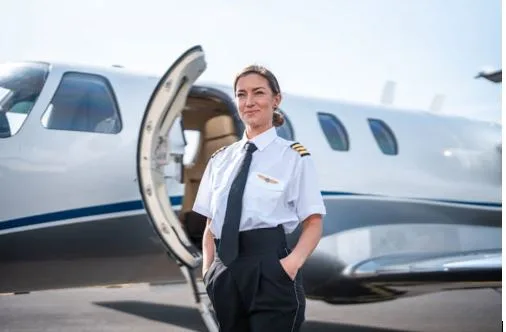Top Skills and Qualifications to Stand Out in U.S. Commercial Pilot Job Market
Intro
The commercial pilot job market USA in 2025 is full of opportunity, but also growing competition. Airlines are hiring to fill record demand, yet they are more selective about the skills and qualifications new pilots bring to the table. For students and recent graduates, this means standing out has never been more important.
Flight hours and licenses remain the foundation, but they are no longer enough on their own. Employers want well-rounded aviators who can make decisions under pressure, adapt to new technology, and communicate clearly in the cockpit. These added expectations can feel overwhelming for new pilots, especially when the stress of training costs and career uncertainty is already present.
The good news is that building these skills and earning the right qualifications is achievable with the right plan. By focusing on what matters most to recruiters, new pilots can reduce the pressure of job hunting and position themselves for long-term success in aviation.
Why the Pilot Job Market in 2025 Is More Competitive
In 2025 the commercial pilot job market USA is shaped by two forces: growing demand and increasing competition. Airlines are expanding routes and replacing retiring captains, which means thousands of new jobs are opening. At the same time, flight schools are graduating more students than ever, creating a larger pool of candidates for each position.
This balance of demand and supply changes how airlines hire. Employers now look beyond basic licenses and flight hours. They want pilots who demonstrate leadership, adaptability, and technical knowledge in addition to meeting regulatory requirements. For new graduates, this raises the bar and adds pressure to stand out from the crowd.
Industry data supports this shift. According to the Bureau of Labor Statistics, commercial pilot career USA trends show steady job growth, but also highlight that employers prioritize pilots with broader skills and advanced qualifications. For students, this means preparation must extend beyond passing exams — it’s about building a profile that aligns with what airlines value most.
Core Qualifications That Open the Door to Flying Jobs
Every pilot must meet a baseline of qualifications before being considered for employment. These requirements are non-negotiable, and they form the first step to entering the commercial pilot job market USA. Without them, even the strongest skills will not be enough.
The core qualifications include:
- FAA medical certification
- Commercial Pilot License (CPL) or Airline Transport Pilot (ATP)
- Minimum flight hours
- English language proficiency and legal eligibility
The FAA medical exam ensures pilots are physically and mentally fit for duty. This step reassures employers that a candidate can handle the demands of flight without compromising safety.
The CPL or ATP license is the cornerstone of employability. Without it, no pilot can enter commercial operations. Building toward an ATP also shows commitment to long-term career growth.
Flight hours remain one of the clearest benchmarks of experience. Airlines often set minimum thresholds, and meeting or exceeding them signals readiness for real-world flying.
Finally, English proficiency and legal work eligibility are mandatory for airline operations. These may seem straightforward, but failing to meet them can block otherwise qualified pilots from progressing in their careers.
For students preparing for this stage, understanding pilot qualifications USA is essential. Florida Flyers provides structured pathways to help aspiring aviators meet these requirements and position themselves for success.
Key Skills That Help Pilots Stand Out to Employers
Meeting the minimum qualifications may get a foot in the door, but it’s the extra skills that separate standout candidates in the commercial pilot job market USA. Airlines today expect pilots to be more than just technically competent, they want professionals who bring value beyond flight hours.
The most valued skills include:
Decision-making and problem-solving: Pilots must make fast, accurate calls in dynamic conditions, from weather shifts to mechanical issues. Employers prioritize candidates who show calm, logical thinking under pressure.
Strong communication: Clear interaction with air traffic control, crew, and passengers is vital. Communication skills also reflect teamwork and leadership, both of which airlines actively look for.
Technical knowledge of advanced avionics: Modern cockpits demand fluency with digital systems. Pilots comfortable with new aircraft technologies are more adaptable and reduce training costs for employers.
Leadership and teamwork: Employers value candidates who can work effectively with crews, inspire confidence, and maintain professionalism in high-stress situations.
Pilots who cultivate these skills demonstrate they are ready for the responsibilities of commercial aviation. More importantly, they reduce the uncertainty employers face when hiring new graduates. That confidence often translates into faster job offers and smoother career progression.
Developing Strengths Beyond Flight Hours
Flight hours are essential, but they don’t tell the whole story. In the commercial pilot job market USA, employers increasingly want pilots who bring strengths beyond the logbook. Building these qualities not only improves job prospects but also helps reduce the stress that comes with competing against other new graduates.
Key areas to focus on include:
- Continuous training through simulators and advanced courses
- Mentorship and networking with experienced pilots
- Adaptability to new aircraft and emerging technologies
- Personal resilience and stress management
Modern simulators allow pilots to practice complex scenarios in a safe environment, building confidence that translates directly to real-world flying. Airlines value candidates who have invested in this type of training because it shows initiative and readiness.
Mentorship and networking expand opportunities far beyond technical training. Learning from experienced aviators provides insight into airline culture, career paths, and the unwritten skills that employers expect.
Adaptability is another factor that sets candidates apart. As aircraft become more advanced, airlines look for pilots who can quickly transition to new systems without hesitation. This ability signals long-term potential.
Finally, resilience and stress management are crucial. Employers understand that pilots will face high-pressure situations. Those who demonstrate composure under stress not only keep flights safe but also inspire trust among crews and passengers. Developing the skills needed to be a pilot in this broader sense positions graduates for long-term success in the job market.
Career Prospects for Skilled Pilots in the U.S.
The future of the commercial pilot job market USA is promising for those who come prepared. Airlines continue to expand fleets, cargo operators are growing with e-commerce, and corporate aviation remains strong. This demand ensures that pilots with the right mix of skills and qualifications will find opportunities across multiple sectors.
Career progression is also faster for well-prepared candidates. Pilots who demonstrate leadership, adaptability, and technical knowledge often move more quickly from regional carriers into major airlines. Each promotion brings higher pay, better routes, and stronger job security, turning the stress of starting out into long-term stability.
Salary growth further strengthens career prospects. While entry-level pay may feel modest compared to training costs, the jump to six figures within a few years rewards persistence. For skilled pilots, this path is not just about covering expenses, it’s about building a sustainable career with global opportunities.
Building a Strong Future in Aviation
The commercial pilot job market USA in 2025 is full of opportunity, but success depends on more than licenses and flight hours. Airlines want pilots who combine strong qualifications with the right skills, from decision-making and communication to adaptability and resilience.
For students and new graduates, this is encouraging. It means that standing out is within reach by focusing on what employers value most. Building these abilities not only improves career prospects but also reduces the stress of entering a competitive market.
In aviation, the path to success is clear: earn the required qualifications, sharpen your skills, and show employers you’re ready for the responsibilities of the cockpit. With this approach, the doors to long-term stability and growth in 2025 and beyond are wide open.





